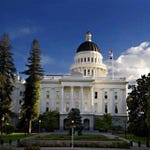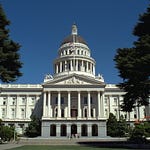
STATE — Tensions are at a boiling point over gas prices, new gas taxes and the potential for $8 for one gallon of gas by late next year.
On July 1, the state’s gas tax will automatically increase by 2 cents per gallon under Senate Bill 1, along with a new regulation from the California Air Resources Board expected to increase prices up to 67 cents per gallon, according a study from the Kleinman Center for Energy Policy at the University of Pennsylvania. CARB’s projections showed prices would increase up to 47 cents per gallon.
As a result, many state legislators are hitting the panic button as the impending closure of two oil refineries are projected to send gas prices even higher. Several weeks ago, the issue exploded when a study from the University of Southern California’s Marshall School of Business projected prices could reach $8 per gallon by 2026 due to the refinery closures.
California has the highest prices and tax rate for gas in the country. As of Wednesday, the average price for one gallon of unleaded gas was $4.74 and $4.72 in San Diego County, according to AAA. The highest average price in the state is in Mono County at $5.92, and the lowest is Imperial County at $4.34, AAA reported. Another 23 counties, including Mono County, are at or above $5 per gallon.
State legislature
Democrats and Republicans have been at odds for the past several weeks over the refinery closures, increasing gas taxes and the new regulations from CARB.
Democrats blocked two bills — one each in the Senate (SB 2) and Assembly (AB 12) — which would have stopped the CARB regulations from taking effect. Republicans are pointing to CARB’s new Low Carbon Fuel Standard regulations, the study from the Kleinman Center for Energy Policy and revelations from CARB as reasons to hit the brakes on those increases.
Assembly Republicans tried to suspend the state constitution to bring AB 12 to the floor, which would halt CA’s updated Low Carbon Fuel Standard from going into effect. The effort failed in a 39-18 vote, per reports. SB failed 23-10.

Sen. Catherine Blakespear (D-Encinitas) voted against SB 2, which was authored by Sen. Brian Jones (R-San Diego). As for AB 12, Assemblywoman Darshana Patel (D-San Diego) , voted against, Assemblywoman Tasha Boener (D-Encinitas) did not vote, and Assemblywoman Laurie Davies (R-Laguna Niguel) and Carl DeMaio (R-San Diego) voted in favor. Jones, Boerner, Patel, Davies and DeMaio all represent parts of North County.
“Democrats love to talk about affordability until they actually have to vote on it,” Jones said. “Senate Republicans will keep fighting to stop these reckless gas hikes and force real accountability from the Governor and his regulators.”
Those revelations came when State Assembly members held a tense and contentious hearing two weeks ago in the Assembly Utilities and Energy Committee. They learned from Liane Randolph, the chair of the California Air Resources Board (CARB), the agency does not analyze how climate change policies on cutting the use of oil and gas will impact gas prices and residents.
However, Republicans have slammed Democrats who voted for ever-constricting laws such as SBX1-2 and ABX2-1, which were pushed by Gov. Gavin Newsom in special sessions.
CARB and many lawmakers have accused oil companies of price gouging; however, during the hearing, which also included Siva Gunda of the California Energy Commission and Tai Milder of the California Division of Petroleum Market Oversight, none of those agencies were able to provide evidence of price gouging.
But what really ignited outrage was when Randolph told the committee CARB does not analyze how clean air rules could impact costs for residents across the state. She said CARB doesn’t want to take the next step to extrapolate how the cost would flow to the consumer because it would be speculation.
However, CARB ran back those statements after Republicans and others ripped the board for not including financial impacts on residents for those policies.
On June 30, Assemblywoman Jasmeet Bains (D-Delano) called for Randolph’s resignation, which drew backlash from her party and Newsom. CARB is an unelected board with 16 members, 12 of whom are appointed by the governor.
“CARB has been given so much power they were prepared to ban gas and diesel cars and trucks single-handedly,” Bains said in a statement. “It is outrageous the director would pursue such policies without even trying to analyze the impacts on prices.”
After Bains’ call for Randolph’s resignation, CARB sent KCRA a statement saying they “do” analyze the impact of clean air rules to consumers. Bains’ call for Randolph’s resignation also sparked outrage from Newsom’s office on Friday.
“What’s outrageous is the Assemblymember’s stunt as she gears up to run for Congress,” Newsom’s spokesman Daniel Villasenor said. “Chair Randolph’s record leading California's clean air progress speaks for itself — especially as Assemblymember Bains joins Trump in carrying water for big polluters. CARB follows requirements set by the Legislature to evaluate economic impacts.”
Some blasted Villasenor regarding Randolph when Newsom has shown interest in running for president in 2028 and the new LCFS regulation promotes ethanol use. Ethanol is a low-carbon fuel under the LCFS and critics of Newsom have said he’s pandering to Iowa farmers in preparation for his expected presidential run in 2028. Iowa is the first state to vote in the presidential primaries.
Refinery closures
Regardless, several new laws and CARB regulations over the past several years led oil companies and other experts to warn they would kill the industry, increase prices, eliminate jobs and more. Last year, Phillips 66 announced it will close its Los Angeles refinery late this year, while Valero also announced it will close one of its refineries. In 2024, Chevron announced the move of its headquarters from Northern California to Texas after more than 150 years in California.
The Phillips 66 and Valero refineries account for 21% of the state’s refining capacity, according to reports. Gunda said the closures will force the state to increase oil imports, while Randolph confirmed those vessels, which the state has no authority to regulate, will create more emissions.
California’s oil production, meanwhile, has decreased by about 68% since 1981, according to the USC report. Residents consumers more than 13.1 million gallons of gas per day.
Adding to the problem, the refinery shutdowns could put the state in a deficit between 6.6 million to 13.1 million gallons per day, per the report. Currently, the state produces 23.7% of its own supply.
Should the refineries close, the report states California’s options to satisfy demand include Gulf Coast, Korean and Chinese refineries.
“Reductions in fuel supplies of this magnitude will resonate throughout multiple supply chains affecting production, costs, and prices across many industries such as air travel, food delivery, agricultural production, manufacturing, electrical power generation, distribution, groceries, and healthcare,” the report reads. “Additionally, a reduction in gasoline production and related price increases will likely have a dragging effect on the growth of California’s GDP, and have a significant impact on the affordability of living in the Golden State, as well as personal and household spending patterns and saving behaviors. “
Last year, Randolph and CARB came under a barrage of fire from state Republicans and others for refusing to analyze whether updates to CARB’s Low Carbon Fuel Standard would impact gas prices. Researchers released studies projecting an increase up to 65 cents per gallon in 2025 and more than $1 by 2030.
California’s Office of Administrative Law blocked CARB’s new regulation earlier this year, although CARB is hoping for the implementation by July 1.
Critics of the CARB have also ripped Newsom’s executive order banning the sales of new gas-powered vehicles by 2035, which would also put added financial pressure on gas prices and residents who are unable to afford a new electric vehicle, among other concerns.
Assemblyman David Alvarez (D-San Diego) appeared shocked during the hearing these actions by the state and regulators may have contributed to the crisis.
“We have a crisis on our hands that may have been self-created by the actions perhaps taken by the state, by regulators,” he said. “I’m curious and a little bit frustrated as I sat here during the special session for many hours listening to you all. Here we are more than six months after that, acting with urgency because price gouging and skyrocketing fuel costs, and I don’t hear today any evidence of that occurred, quite the contrary.”
Assemblywoman Cottie Petrie-Norris (D-Irvine), who chairs the committee, questioned Milder, who claimed the oil and gas industry had more profit than anywhere else in the country due to higher gas prices. She said $10 per gallon prices is not leadership.
“If California companies were raking it in, why did we have two refineries announce their intent to close?” Petrie-Norris said. “I’m not clear how you’re asserting they’re making more money here than they are around the country, if that were the case we would not have two refineries announce they’re closing.”
CARB administers the state’s cap-and-trade program, which is estimated to increase gas prices by 30 cents per gallon, Bains said. California has the highest rate of taxes on one gallon of gas, with estimates between $1.20 and $1.30.
Also, Nevada and Arizona prices would be impacted as those states rely on pipelines from California. Governors Katie Hobbs (D-AZ) and Joe Lombardo (R-NV) sent a joint letter to Newsom to withdraw his proposal as it would impact gas prices in those states. Both Arizona and Nevada receive more than 50% of their gas from California pipelines.
Newsom’s laws passed in the special session require oil companies to create gas reserves to avoid unexpected refinery shutdowns during maintenance. Oil companies warned the state the cost to build the infrastructure would overwhelm prices and take years, so some would likely abandon the state.
Follow North County Pipeline on Instagram, Facebook, X and Reddit. Send story ideas and tips to ncpipeline760@gmail.com.











